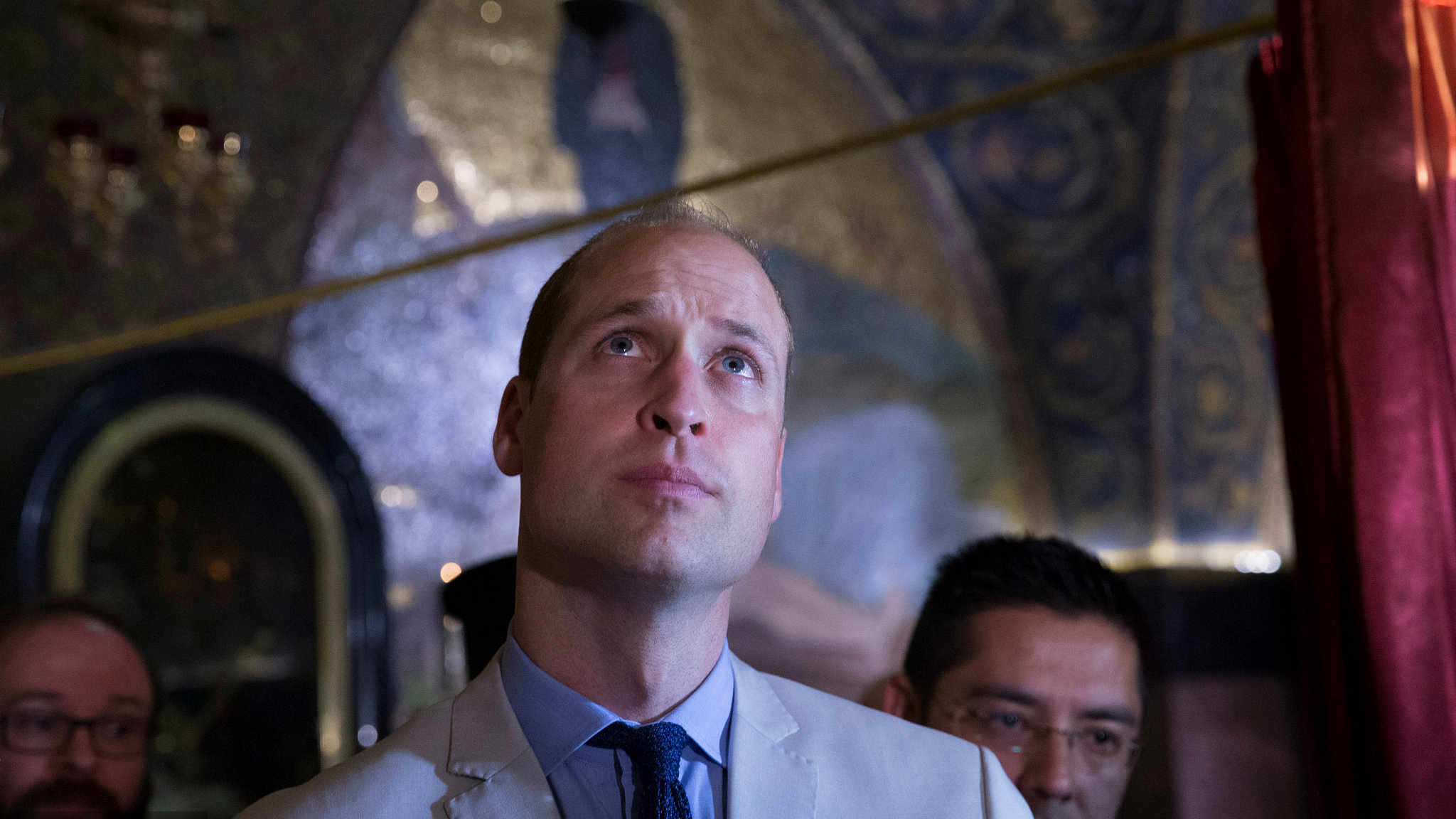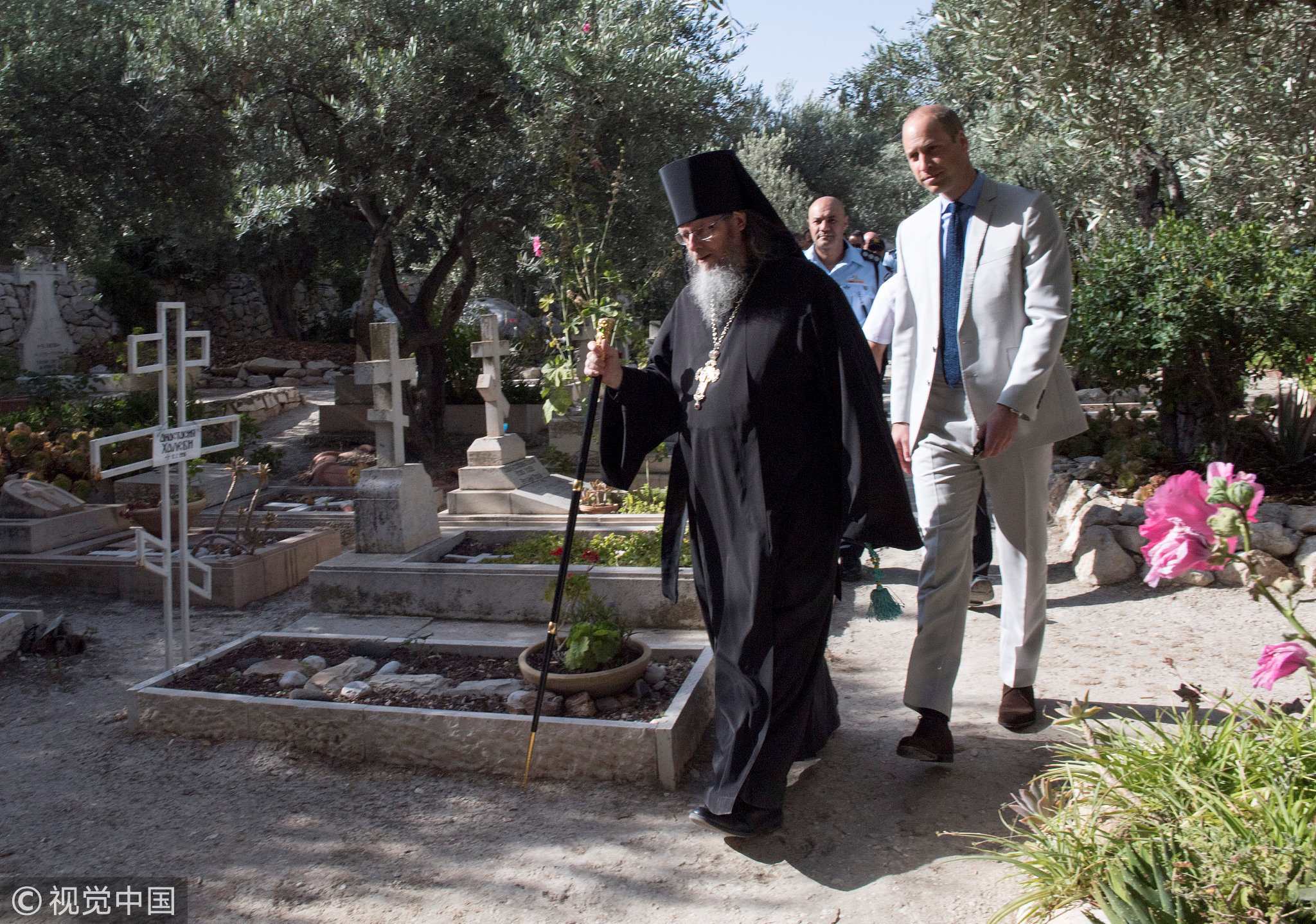
Opinions
21:45, 29-Jun-2018
Opinion: British royal's cautious return to the Middle East
Updated
20:58, 02-Jul-2018
Wang Jin

Editor's note: Wang Jin is a Research Fellow at Charhar Institute and a Research Fellow at the Syria Research Center at Northwest University, China. The article reflects the author's opinion, and not necessarily the views of CGTN.
As a historic moment in UK-Israel ties, Prince William’s visit to Israel has marked the first ever official royal visit to Israel and the Palestinian Territories ever since modern Israel was established in 1948.
The visit has been interpreted as an important gesture to consolidate the UK’s relationship with Israel and facilitate the peace negotiation between Israel and Palestine.
Prince William’s visit to Israel and Palestinian Territories was decided last November when British seniors celebrated the 100th anniversary of the Balfour Declaration with Israeli leaders in the UK. The Balfour Declaration, which promised by UK government amid World War I to support “the establishment in Palestine of a national home for the Jewish people”, has become the foundation for the construction of the modern Israel state in the 20th century. And the UK has been perceived by Israel and Jewish people as a supporter for the birth of Israel in 1948.

Israeli Prime Minister Benjamin Netanyahu and his wife Sara look at the original Balfour Declaration while visiting the British Library in London, Britain, Sept. 10, 2015. /VCG Photo
Israeli Prime Minister Benjamin Netanyahu and his wife Sara look at the original Balfour Declaration while visiting the British Library in London, Britain, Sept. 10, 2015. /VCG Photo
Although Israel highlights the “political gestures” of Prince William’s visit, for example, Israeli president Reuven Rivlin asked Prince William to send his “message of peace” to Palestinian President Mahmoud Abbas; and Israeli prime minister Benjamin Netanyahu called Prince William’s visit a “historic one”, both Prince William and British diplomats downplay the political attribute of the visit.
Prince William himself portrayed his visit as a trip of “absorbing and understanding the different issues, cultures, and religions”. UK Ambassador David Quarrey described Prince William as “not a political figure. He’ll be here to see a little bit of the country and to get to meet some of the people here.”
The UK’s role in the Middle East was the most important. The geopolitical map in the Middle East from North Africa to the Gulf today was drawn by the UK.
It was the UK that supported the Arab uprising led by Hussein Ibn Ali in 1916 and partly led to the collapse of Ottoman Empire in the Middle East; it was the UK that constructed the modern Iraq and Jordan in the 1920s, and encouraged and permitted the Jewish immigrants to move from Europe to Palestine through the Balfour Declaration; it was the UK that protected the small emirs, which became small Gulf states including the UAE, Qatar, and Bahrain, in the seashore area of the Gulf from the expansion of Saudi Arabia's Ikhwan militants.

Britain's Prince William meets Prime Minister Benjamin Netanyahu and his wife Sara Ben-Artzi at Beit Aghion, the official residence of the Prime Minister, June 26, 2018, in Jerusalem, Israel. /VCG Photo
Britain's Prince William meets Prime Minister Benjamin Netanyahu and his wife Sara Ben-Artzi at Beit Aghion, the official residence of the Prime Minister, June 26, 2018, in Jerusalem, Israel. /VCG Photo
However, the UK’s relations with Israel were not peaceful in the late 1940s. During the Israel-Arab war in 1948, the UK stood firmly with its Arab allies, especially Jordan, Saudi Arabia and Egypt, with the aim of retaking all Palestine from Jewish Zionist militants. Royal Air Force aircraft took off from Egyptian airbases and sometimes flew alongside Royal Egyptian Air Force planes, while some high-flying British aircraft frequently flew over Haifa and Ramat David Airbase.
It is only in 1949 when the UK recognized Israel de facto, their diplomatic relation was formally established in 1954.
Since 1950s, the relation between UK and Israel has largely kept positive. The economic relations between the states prosper, and the high-tech and R&D cooperation also develops.
However, Prince William still needs to speak and act with extreme caution in avoidance of provoking Palestinians. On Prince William's trip agenda was the Old City of Jerusalem, which was described by the UK embassy in Israel as the “Occupied Palestinian Territories”, a description defended by UK Ambassador David Quarrey as “consistent with British government policy”.

Britain's Prince William visits the Church of St Mary Magdalene, in east Jerusalem, Israel, June 28, 2018. /VCG Photo
Britain's Prince William visits the Church of St Mary Magdalene, in east Jerusalem, Israel, June 28, 2018. /VCG Photo
When Prince William visited the West Bank and met with Palestinian President Mahmoud Abbas in Ramallah, he again reiterated the UK’s neutral and balanced policy: “The United Kingdom stands with you, as we work together for a peaceful and prosperous future”.
Although it has acted as a hegemony in the Middle East, the UK’s influence faded in the latter half of 20th century. However, as an important member of the royal family with all eyes on him, Prince William’s "historic visit" to the Middle East might help the international society to re-focus on the long stalemate of the Israel-Palestine peace process.
(Cover Photo: Britain's Prince William visits the Church of the Holy Sepulchre in Jerusalem's Old City, June 28, 2018. /VCG Photo )

SITEMAP
Copyright © 2018 CGTN. Beijing ICP prepared NO.16065310-3
Copyright © 2018 CGTN. Beijing ICP prepared NO.16065310-3